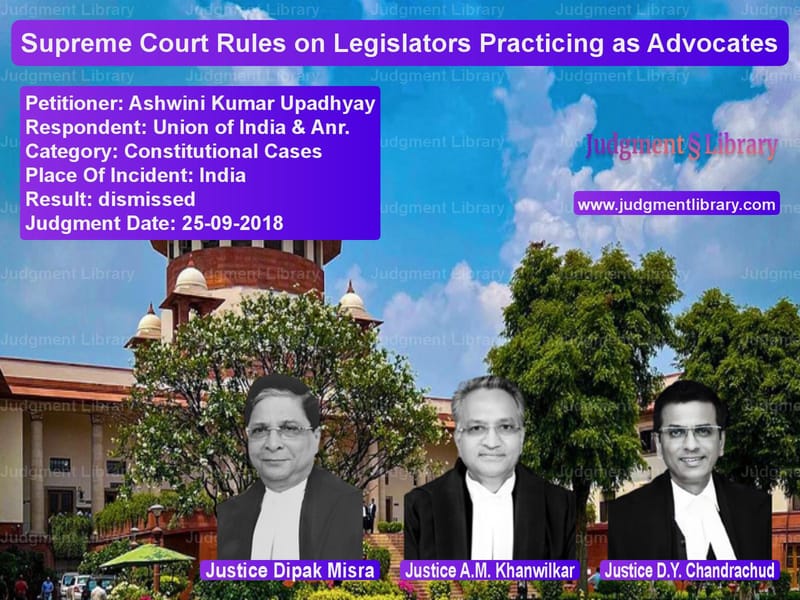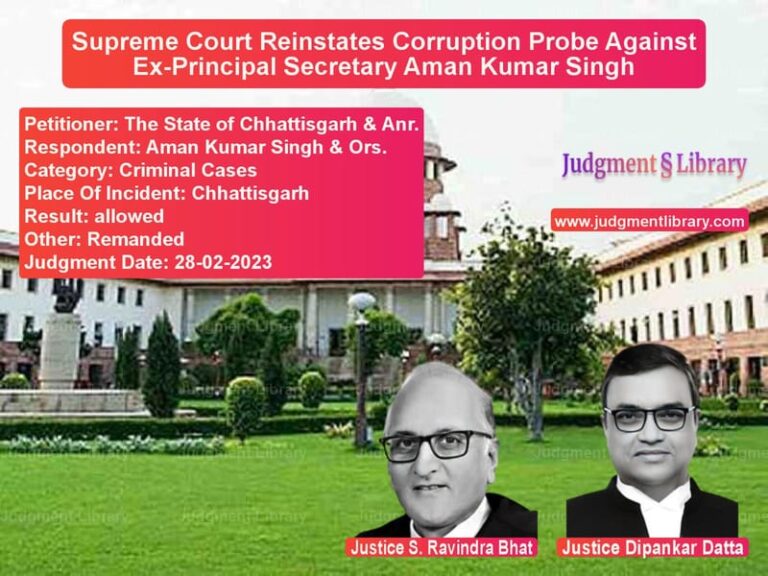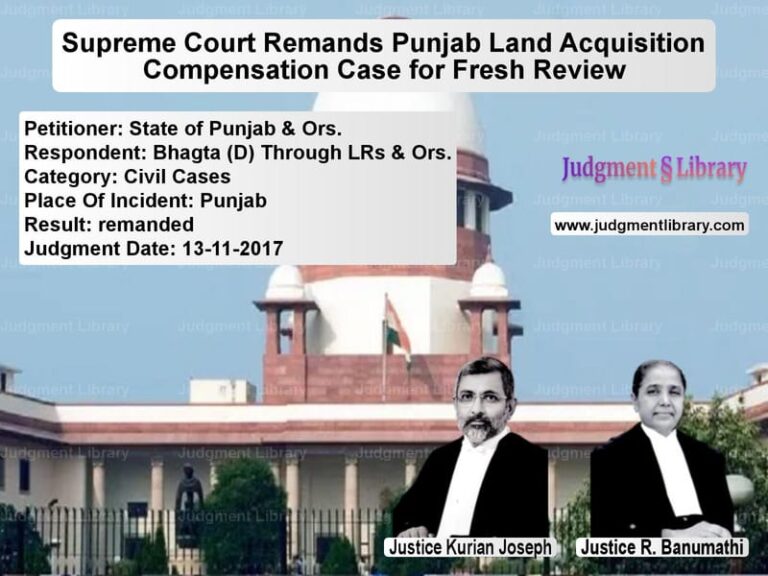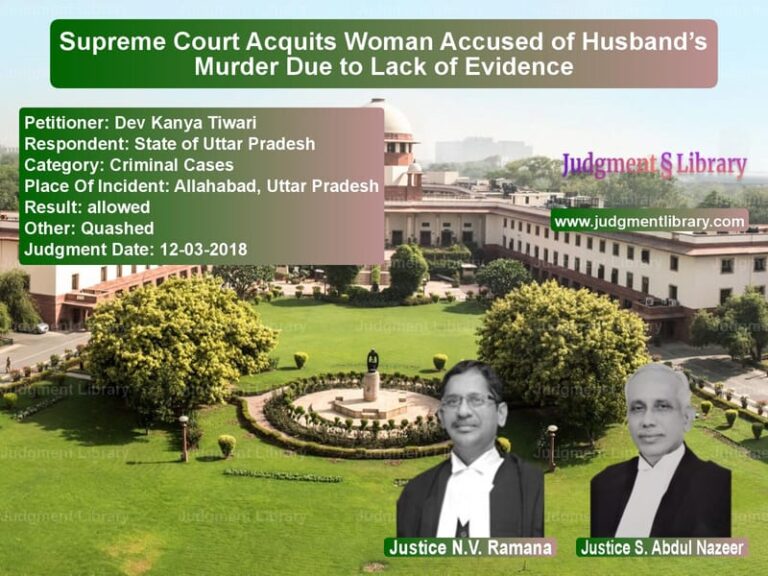Supreme Court Rules on Legislators Practicing as Advocates
The Supreme Court of India, in its judgment in Ashwini Kumar Upadhyay vs. Union of India, addressed the question of whether legislators (MPs and MLAs) can practice as advocates while holding public office. The case, filed as a Public Interest Litigation (PIL), sought to debar legislators from practicing law, arguing that it posed a conflict of interest and violated the principles of legal ethics.
Background of the Case
The petitioner, Ashwini Kumar Upadhyay, argued that legislators take a constitutional oath to serve the people and, therefore, should not engage in any other profession, especially one that may create a conflict of interest. The primary contentions were:
- Legislators receive a salary and benefits from public funds and should devote their full time to serving their constituents.
- Practicing law while being a legislator allows undue influence over judicial processes.
- Allowing such practice creates an unequal playing field, as legislators may have access to confidential state information that other lawyers do not.
- Rule 49 of the Bar Council of India prohibits full-time employees from practicing as advocates, and the same principle should apply to legislators.
Petitioner’s Arguments
The petitioner contended:
- Allowing legislators to practice as advocates undermines public confidence in the independence of the judiciary.
- Legislators, while practicing law, may have to argue against laws that they have themselves participated in enacting.
- Many legislators frequently appear on television and in media discussions, which amounts to advertising their legal practice, violating legal ethics.
- The Bar Council of India (BCI) must impose clear restrictions on legislators, just as it does for other professionals who hold full-time positions.
Respondent’s Arguments
The respondents, including the Union of India and the Bar Council of India, countered:
- There is no express provision in the Advocates Act, 1961 or the Bar Council Rules that prohibits legislators from practicing law.
- Legislators are not full-time employees of the government; they are elected representatives, and their status is different from government employees.
- The Bar Council of India had already deliberated on the issue and concluded that there was no need for an explicit ban on legislators practicing as advocates.
Key Observations by the Supreme Court
The Supreme Court bench, led by Chief Justice Dipak Misra, Justice A.M. Khanwilkar, and Justice D.Y. Chandrachud, made the following observations:
- “The profession of law is a noble one and requires undivided attention, but the legislature has not imposed any restriction on legislators practicing as advocates.”
- “Legislators do not fit within the definition of ‘full-time salaried employees’ under Rule 49 of the Bar Council Rules. They are elected representatives and not in an employer-employee relationship with the government.”
- “The concept of ‘conflict of interest’ is case-specific and cannot be assumed merely because someone is both a legislator and a lawyer.”
- “The Bar Council of India, the regulatory body, has itself determined that there is no necessity for a blanket ban on legislators practicing law.”
Final Judgment
The Supreme Court ruled:
- The petition to bar legislators from practicing as advocates was dismissed.
- There is no legal provision that prohibits MPs or MLAs from practicing law.
- Any conflict of interest arising from a specific case must be addressed on an individual basis, rather than through a blanket ban.
- The Bar Council of India retains the authority to regulate the legal profession, and unless it chooses to impose restrictions, the Court will not interfere.
Impact of the Judgment
The judgment reaffirmed the autonomy of the legal profession and underscored that legislators, while holding public office, can continue to practice as advocates. The ruling has several implications:
- Maintains the existing legal framework: The judgment upheld the status quo, allowing legislators to continue their legal practice.
- Emphasizes the role of the Bar Council: The Court reinforced that the regulation of legal practice is within the purview of the Bar Council of India.
- Sets a precedent for conflict of interest cases: The ruling clarified that any concerns regarding conflict of interest should be addressed on a case-by-case basis.
Overall, the Supreme Court’s decision reflects a balance between constitutional responsibilities and professional rights, allowing legislators to practice law while ensuring that professional misconduct or conflict of interest is dealt with through appropriate legal channels.
Petitioner Name: Ashwini Kumar Upadhyay.Respondent Name: Union of India & Anr..Judgment By: Justice Dipak Misra, Justice A.M. Khanwilkar, Justice D.Y. Chandrachud.Place Of Incident: India.Judgment Date: 25-09-2018.
Don’t miss out on the full details! Download the complete judgment in PDF format below and gain valuable insights instantly!
Download Judgment: Ashwini Kumar Upadhy vs Union of India & Anr Supreme Court of India Judgment Dated 25-09-2018.pdf
Direct Downlaod Judgment: Direct downlaod this Judgment
See all petitions in Fundamental Rights
See all petitions in Constitution Interpretation
See all petitions in Public Interest Litigation
See all petitions in Judgment by Dipak Misra
See all petitions in Judgment by A M Khanwilkar
See all petitions in Judgment by Dhananjaya Y Chandrachud
See all petitions in dismissed
See all petitions in supreme court of India judgments September 2018
See all petitions in 2018 judgments
See all posts in Constitutional Cases Category
See all allowed petitions in Constitutional Cases Category
See all Dismissed petitions in Constitutional Cases Category
See all partially allowed petitions in Constitutional Cases Category







